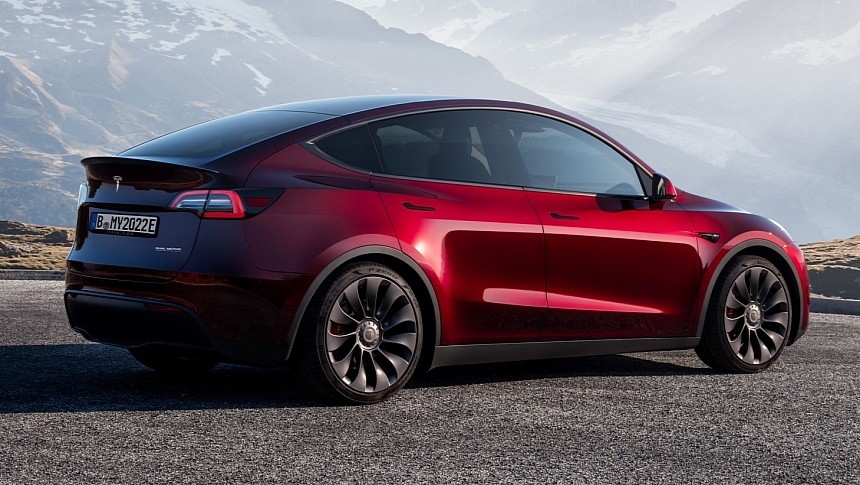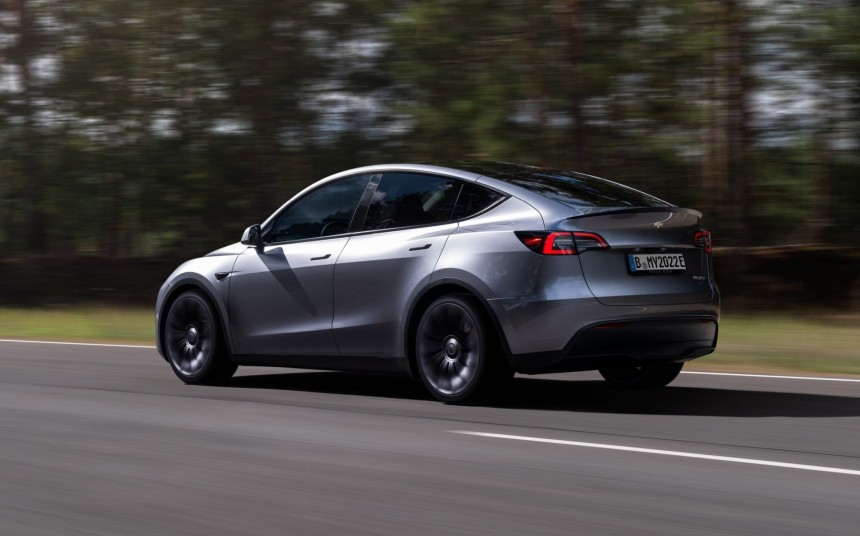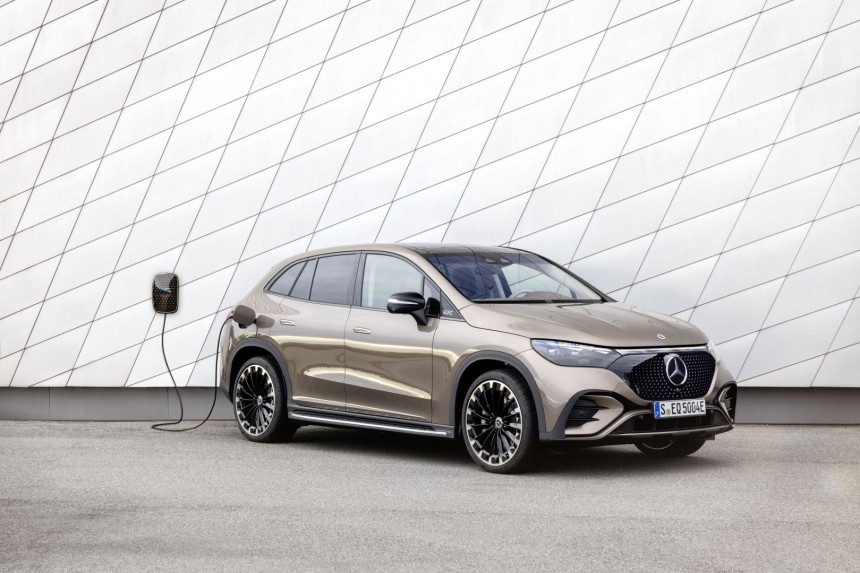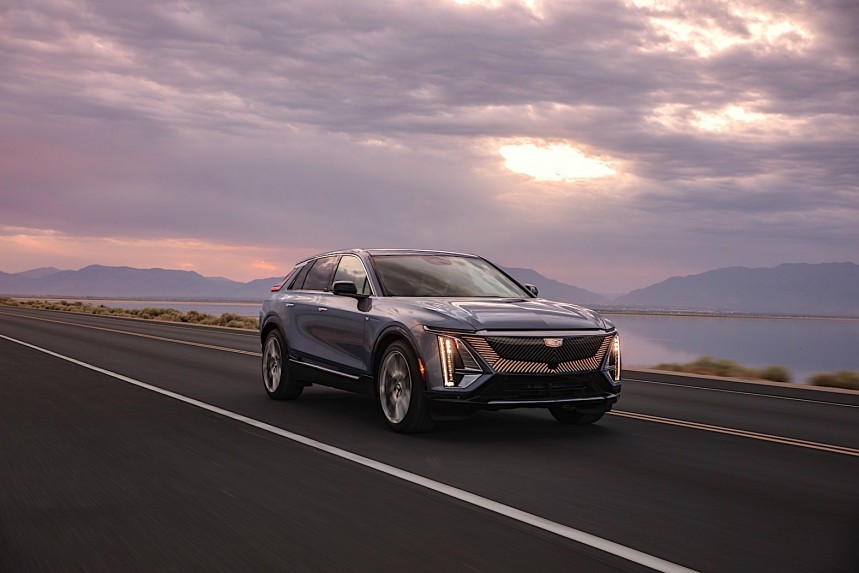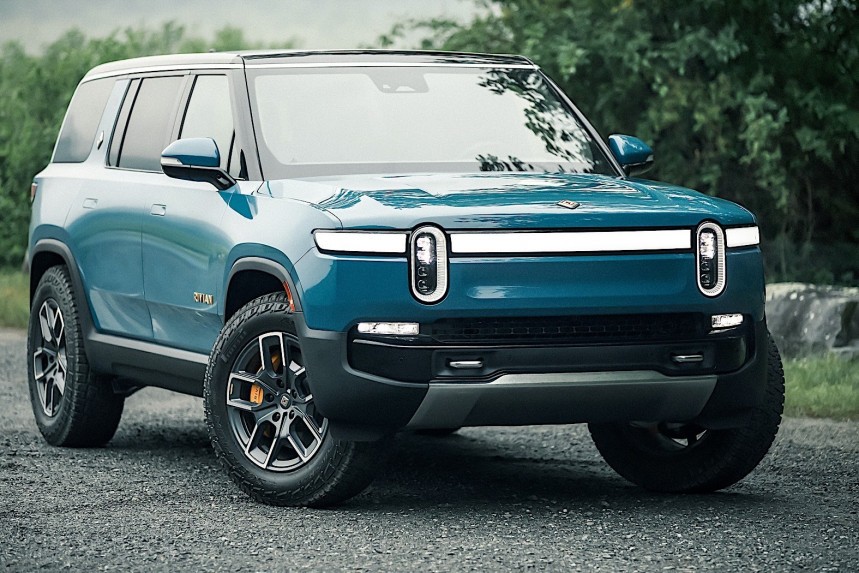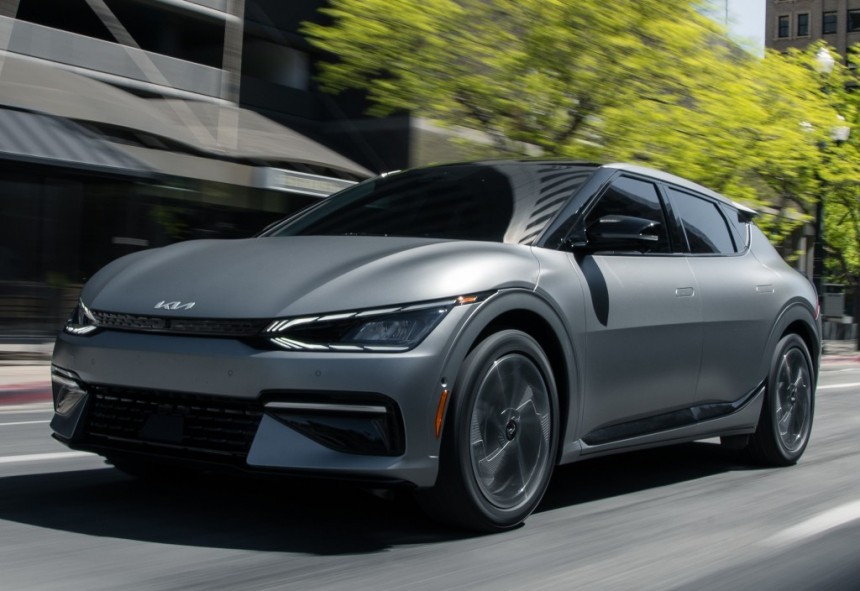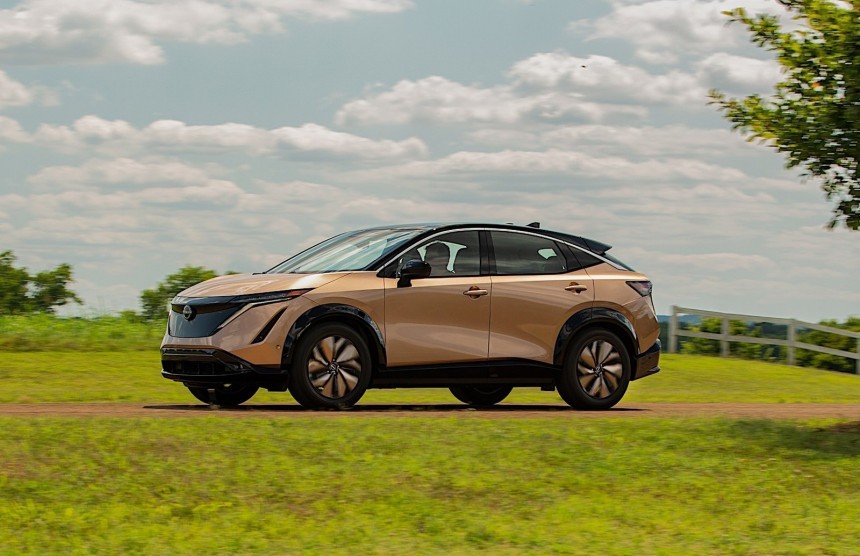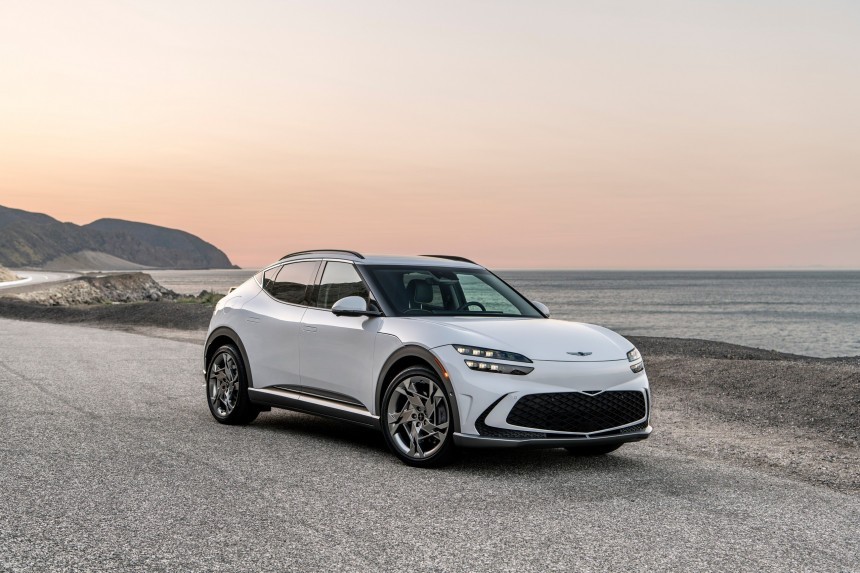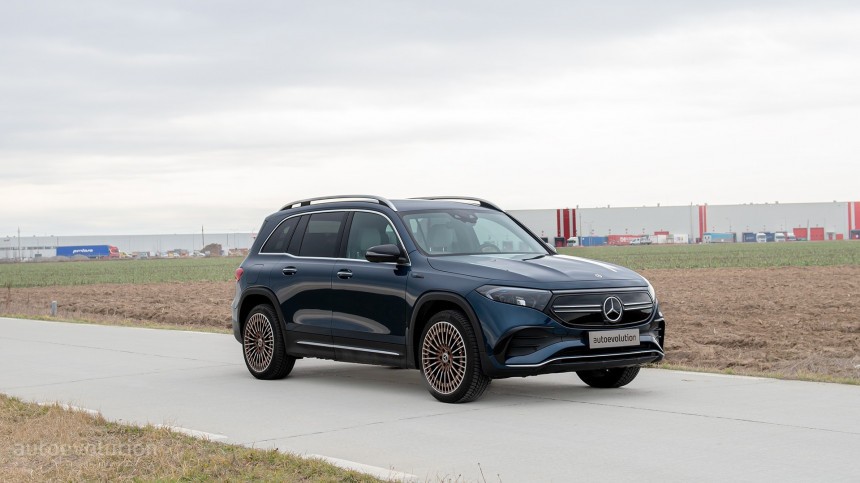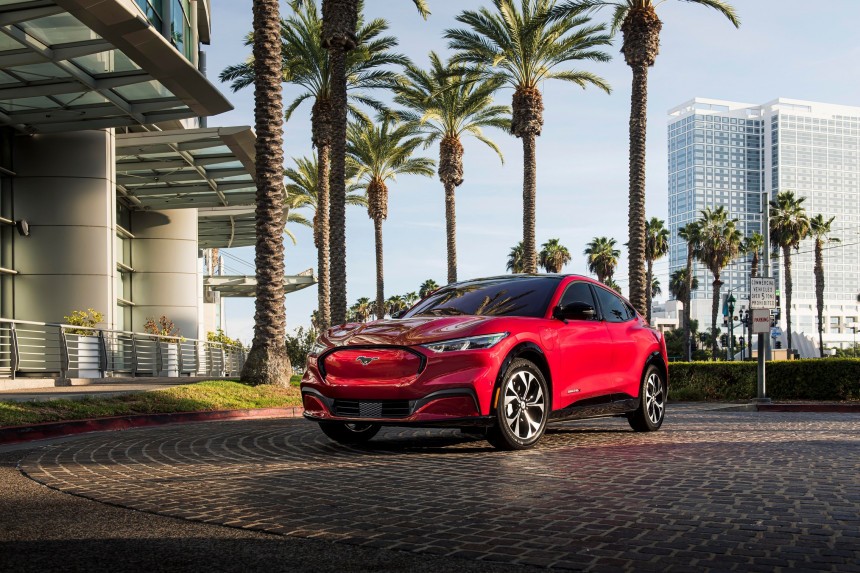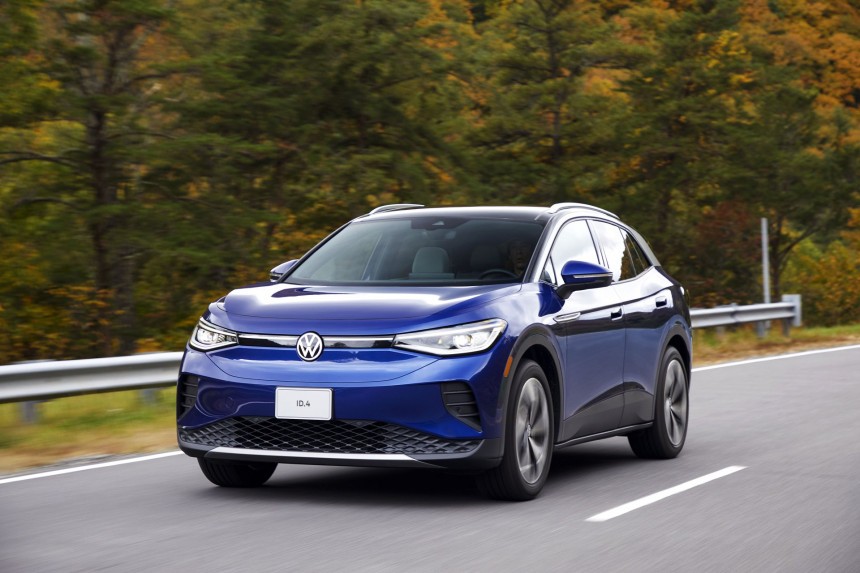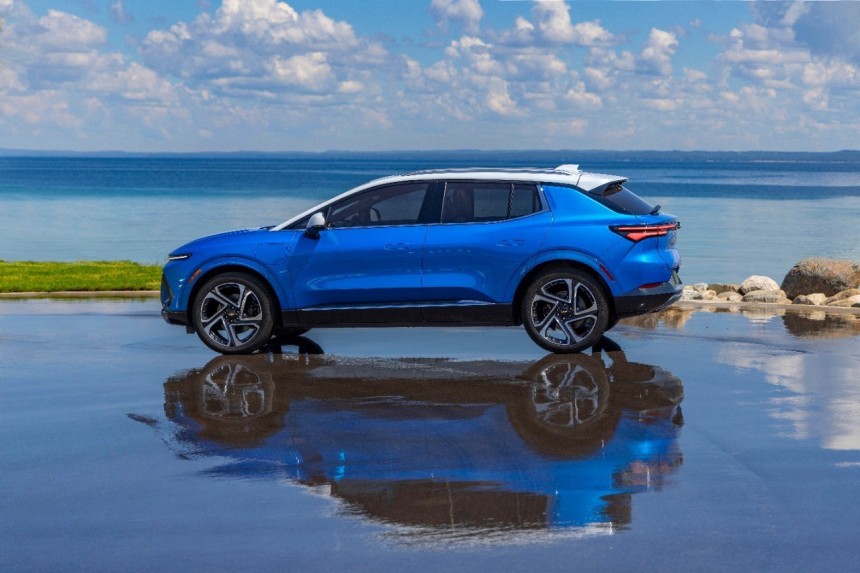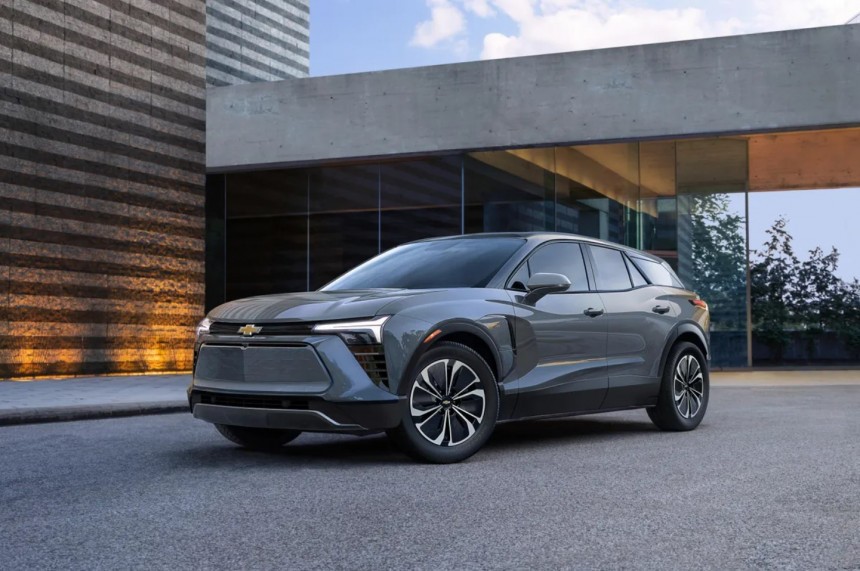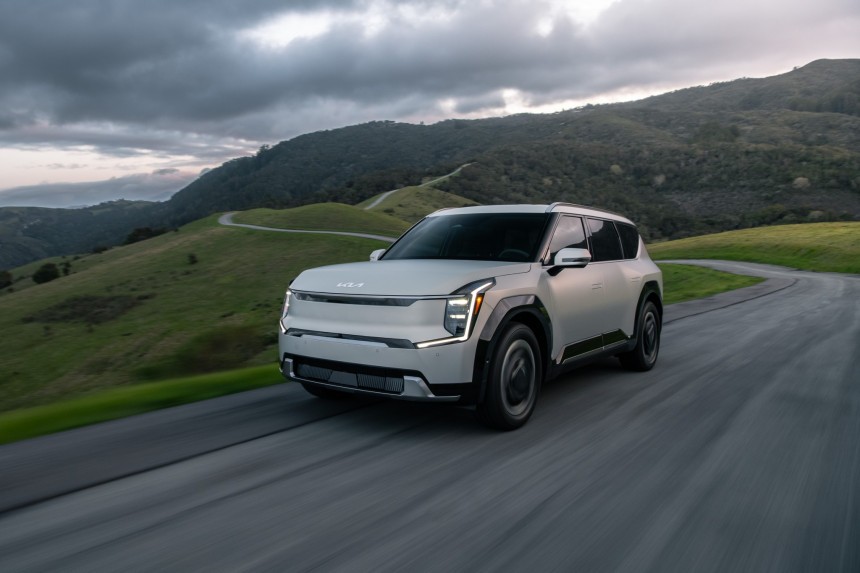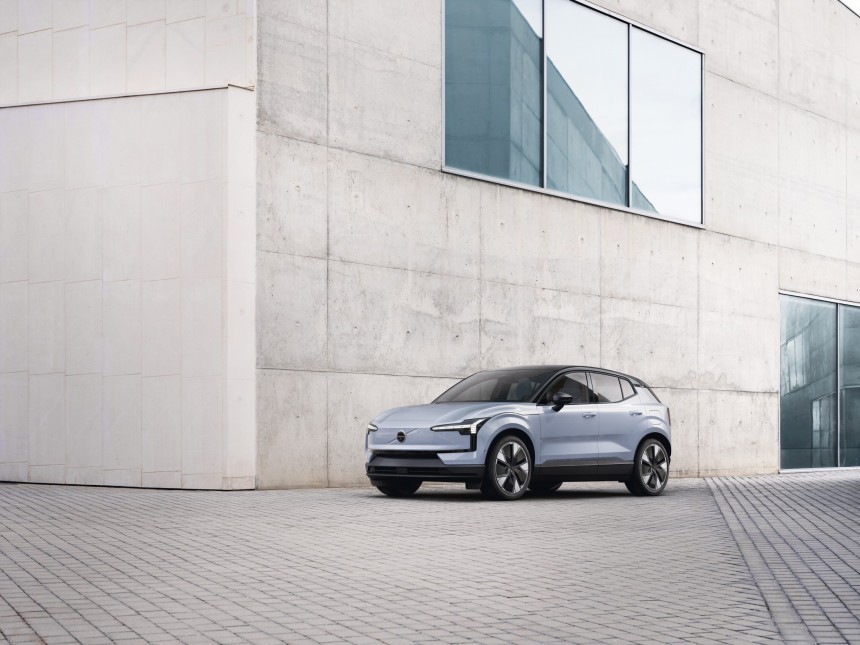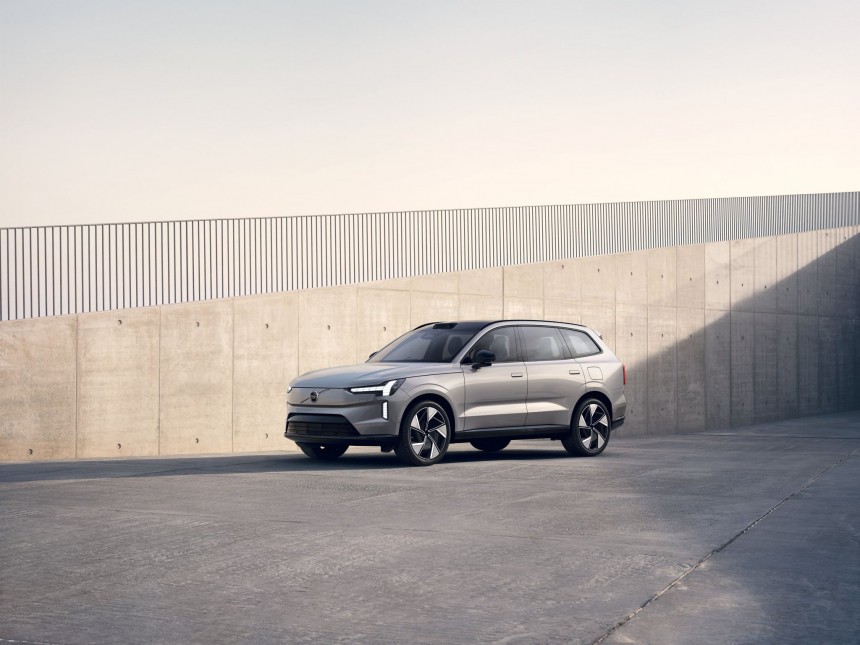Americans are finally more open to buying electric vehicles after being reluctant to embrace the EV revolution for the past ten years. As expected, SUVs are the most in demand, but not all electric SUVs on the market are worth your hard-earned cash. Here are the best of the best electric SUVs you can buy right now (or in the near future).
Although Tesla is an American company, US customers still hesitate to buy electric vehicles. The US EV market lags significantly behind the Chinese and European markets, with less than 10 percent of vehicles sold in the country being battery-electric. When asked what makes them despise electric vehicles, Americans point to the limited range, patchy charging infrastructure, and long charging times, especially compared to filling up a gas tank. All three can be described in just two words: range anxiety.
Still, there are other factors that hinder the adoption of electric vehicles in the US. People fear Li-ion batteries are untrustworthy, with a limited life span and high replacement costs. Some are even more scared of battery fires, even though statistics show that electric vehicles are less likely to catch fire than combustion vehicles. Whatever the reasons, the truth is that there are a lot of preconceptions about electric cars, many entrenched in people's minds from the first-generation Nissan Leaf era.
Still, electric vehicles have advanced a lot, and most models available now offer a reasonable range of about 300 miles. They are also very quick to charge, the best needing less than 20 minutes to charge from near empty (10%) to near full battery (80%). And the final nail in the range anxiety's coffin is the charging infrastructure, which has expanded tremendously. It's hard nowadays to find areas with no charging opportunities, especially as interoperability has been improved.
Although EV critics may still be vocal, more and more people understand the benefits of owning an electric vehicle. This has led to increased sales, and most carmakers are now struggling to produce enough EVs to meet demand. Like in the ICE world, SUVs are the most sought-after electric vehicles. This has led to an "SUV-heavy" market in the US, where roughly two-thirds of EV models are SUVs and crossovers. This means about 30 all-electric SUVs are available to buy right now, with a dozen others planned to start deliveries in the coming months. I've cherry-picked the best 10 electric SUVs of the 2023 vintage, with another five among the most promising future models.
The best electric SUVs on the market
Power: 295-527 horsepower
Battery capacity: 67-75 kWh
Range: 279 – 330 miles
IRA tax credit: $7,500
Seating: 2 rows/5 seats; optional 7 seats for $2,500
Trunk space: 12.8-72.1 cu-ft (363-2,041 liters)
Despite Tesla critics claiming otherwise, the Model Y is the best electric vehicle money can buy. It's no wonder Tesla crossover is the best-selling car in many markets, even when considering combustion vehicles.
The Model Y offers impressive features, including huge interior and trunk space, which allows Tesla to provide a 3-row variant. This is an optional feature available only on the Long Range variant and will add $2,500 to the price of the car. The space for third-row passengers is not great, but it can be useful for short trips.
The Tesla Model Y offers brisk performance, even in the base version, and is among the longer-range EVs on the market. Add to that the benefit of having the Supercharger network at your service, and you see why most people considering an electric car have the Model Y at the top of their list.
The base-version Tesla Model Y AWD features a 67-kWh battery, providing a decent 279-mile (449-km) range. For less than $3,000 extra, you can upgrade to the Long Range variant, which features a 75-kWh battery and delivers the maximum 330-mile (531-km) range.
Pros: supercar-like performance for the top trim, great software, access to FSD Beta
Cons: nothing I can think of
Power: 288-402 horsepower
Battery capacity: 90.6 kWh
Range: 253-279 miles
IRA tax credit: No
Seating: 2 rows/5 seats
Trunk space: 14-55 cu-ft (396-1,557 liters)
The EQE SUV is one of the latest EVs launched in the US market and probably the best Mercedes-Benz has to offer. The Mercedes-Benz EQE SUV is a 5-seater EV that comes in 3 trim levels, with the base version EQE 350+ retailing for $77,900. It's a little pricey, but it's what you have to pay for one of the best build quality you'll find in the market.
The midsize SUV doesn't look very impressive on paper, with a relatively limited range topping at 279 miles (449 km). That's the worst a Tesla Model Y offers, but don't expect miracles considering how big and heavy the EQE SUV is. Still, the battery-electric Merc is no slouch, with even the least powerful variant doing 0-60 mph in 6.3 seconds.
It also has a limited cargo capacity, with one of the smallest trunks in its segment. The EQE only offers 14 cu-ft (396 liters) of space behind the second row. That's less than half the space Tesla Model Y provides in the same conditions. The maximum capacity with the second seat row folded is an acceptable 55 cu-ft (1,557 liters) thanks to the high roof.
Pros: impressive build quality, sophisticated infotainment system
Cons: less cargo space than most rivals, expensive
Power: 340-500 horsepower
Battery capacity: 102 kWh
Range: 307-314 miles
IRA tax credit: $7,500
Seating: 2 rows/5 seats
Trunk space: 28-61 cu-ft (793-1,722 liters)
The Cadillac Lyriq is a two-row luxury crossover offering impressive cabin space and cutting-edge technology at a rather affordable price. It may be Cadillac's first electric vehicle, but it's a very mature and competent EV, ticking all the main boxes.
The 5-seater midsize SUV is offered in three trim levels, but even the base model is well-equipped. The dashboard is screen-heavy, although Cadillac offers physical buttons to access the most important functions. The Lyriq is among the longest in its class, providing plenty of space for passengers and luggage.
The prices start at $58,990 for the RWD version, while the AWD adds $3,500 to the price tag. This is very competitive, considering the Lyriq comes with a $7,500 tax credit for those who qualify. The Lyriq won't disappoint the driver, being fast and smooth, with a natural feel to steering and braking.
Pros: luxurious interior, good range, reasonable performance, practical
Cons: infotainment interface, limited availability
Power: 533-835 horsepower
Battery capacity: 105-180 kWh
Range: 260-352 miles
IRA tax credit: up to $3,750, depending on the version
Seating: 3 rows/7 seats
Trunk space: 17.6-105 cu-ft (498-2,973 liters)
The Rivian R1S is the only full-size SUV in our rankings and a proper 7-seater, offering reasonable comfort for the passengers seated in the third row. If you think the trunk space is not very big, it's because the minimum is measured with all the seats in the upright position. The second and third seat rows fold flat, expanding the cargo area to 105 cu-ft (2,973 liters).
Rivian R1S's unique selling point is its ability to climb off-road trails, and it can do that in perfect comfort. It's the electric equivalent of a Range Rover, if you will, except that it has a far better build quality. With up to 835 horsepower on tap, the R1S is also one of the most powerful all-electric SUVs you can buy now.
Even though Rivian is a new carmaker, you'll find the build quality of the R1S on par with the best in the industry, more than justifying the price. If there's one thing Rivian owners complain is the lack of Android Auto and Apple CarPlay support for the infotainment system.
Pros: Off-road capabilities, huge space, proper 7-seater
Cons: infotainment lacks Apple CarPlay support, some configurations still unavailable
Power: 167-576 horsepower
Battery capacity: 58-77.4 kWh
Range: 206-310 miles
IRA tax credit: No
Seating: 2 rows/5 seats
Trunk space: 24.4-50.2 cu-ft (690-1,422 liters)
Built on the E-GMP platform like its siblings Hyundai Ioniq 5 and Genesis GV60, the Kia EV6 offers a unique set of characteristics, including the impressive performance of the EV6 GT variant. The design sits at the crossroads between hatchback and crossover, something we can also say about the other two related models.
Because of this, its trunk is not among the biggest when the rear seats are folded. Still, considering its small footprint, the EV6 offers a respectable minimum capacity. The slanted roof also affects the headroom in the rear, but the Kia EV6 compensates for this with an exciting design and exhilarating performance.
Thanks to the 800-volt electrical architecture, the Kia all-electric crossover is one of the fastest-charging EVs on the market. It only needs 18 minutes to charge from 10% to 80%, which is perfect for road trips because it minimizes the time spent charging.
Pros: impressive performance for the EV6 GT, decent range, fast charging capabilities
Cons: limited cabin and cargo space, not eligible for IRA tax credit
Power: 208-389 horsepower
Battery capacity: 63-87 kWh
Range: 205-304 miles
IRA tax credit: No
Seating: 2 rows/5 seats
Trunk space: 22.8-59.7 cu-ft (645-1,690 liters)
Nissan was a pioneer of electric vehicles but has become complacent and is now barely breathing in an increasingly competitive market. Although impressive, the Ariya electric crossover arrived too late, and Nissan hardly keeps up with the demand.
Nissan Ariya is roomy, comfortable, and bustling with technology and comfort features. It's a little expensive, although the rich equipment makes up for it. Nevertheless, Nissan Ariya disappoints in a crucial department for an electric vehicle, with one of the slowest charging on the market. The DC fast-charging power is limited to 130 kW, so it needs 40 minutes to charge the bigger battery from 10% to 80%.
On the plus side, Nissan's electric crossover offers decent performance and can sprint to 60 mph (97 kph) in 4.8 seconds in its most spirited version. It also provides up to 304 miles (505 km) of range when you pair the 87-kWh battery with the FWD configuration.
Pros: good interior space, comprehensive tech package, decent performance
Cons: limited range, long charging times, elevated price
Power: 314-429 horsepower
Battery capacity: 77 kWh
Range: 235-248 miles
IRA tax credit: no
Seating: 2 rows/5 seats
Trunk space: 24-54.7 cu-ft (645-1,690 liters)
Genesis somehow managed to squeeze more cargo space than Kia in the trunk of the GV60. With the rear seats folded, the Korean luxury crossover can accommodate up to 54.7 cu-ft (1,690 liters). The downside is that the range is not on the same level as the Kia EV6. Not because the Genesis has a problem but because a more efficient RWD version is not offered.
Like its less noble brother with the controversial Kia badge, the Genesis GV60 is packed with features. The 5-seater crossover is offered in two trim levels (Advanced and Performance), and neither can be considered affordable. Still, both offer a compelling list of comfort and technology goodies, and the build quality won't disappoint.
As with the Kia EV6, the best part of the Genesis GV60 is its short charging time facilitated by the 350-kW DC fast-charging support. The worst is that it is only sold in 23 US states, so availability is not great.
Pros: comfortable and luxurious cabin, fast charging, good performance
Cons: limited range, expensive, limited availability
Power: 188-288 horsepower
Battery capacity: 71 kWh
Range: 221-245 miles
IRA tax credit: No
Seating: 2 rows/5 seats; optional 7 seats for $1,250
Trunk space: 10.7-61.8 cu-ft (303-1,750 liters)
The Mercedes-Benz EQB SUV is one of the best-packaged battery-electric crossovers on the market, with plenty of space in a small footprint. Like the Tesla Model Y, it also offers the option of a third row, although the space is better suitable for children or short trips. When all seven seats are upright, the cargo space is limited to only 10.7 cu-ft (303 liters).
The fit and finish are in the Mercedes-Benz territory, although the selection of materials could have better reflected its luxury-car status. The pricing is very sensible considering the badge, starting just under $53,000. No federal tax credit is offered for the German crossover, although it remains compelling nonetheless.
Offered in front-wheel-drive and all-wheel-drive versions, the Mercedes-Benz EQB provides decent performance, despite a relatively underpowered drivetrain. The most powerful version is the EQB 350 4Matic, with 288 horsepower capable of accelerating to 60 mph in 6.0 seconds. The efficiency is not impressive since the EQB is built on an ICE architecture inherited from its brother GLB. That's why a 77-kWh battery can only provide a maximum range of 245 miles in the FWD EQB 250+.
Pros: spacious cabin and trunk, comfortable, good driving behavior
Cons: limited range, limited third-row passenger space
Power: 266-480 horsepower
Battery capacity: 70-91 kWh
Range: 224-312 miles
IRA tax credit: $3,750
Seating: 2 rows/5 seats
Trunk space: 29.7-59.7 cu-ft (840-1,690 liters)
Ford is having difficulties selling the Mustang Much-E, but this doesn't mean it's not a good electric SUV. The price starts at an affordable $42,995, and the 5-seater qualifies for a $3,750 tax credit under the Inflation Reduction Act (IRA). Four trims are available, and there are RWD and AWD versions.
The best quality of the Ford Mustang Mach-E is that it lives up to its name and can be very agile, despite weighing more than 4,500 lbs./2,000 kg. Even in its base trim, it can do 0-60 mph in 5.8 seconds, with the faster GT version able to cut the time to 3.8 seconds. The downside is a more rigid suspension, which affects comfort.
The range is limited, especially on the Standard Range versions. The Ford Mustang Mach-E California Route 1 eAWD model with the bigger 91-kWh battery will get you the furthest, with an EPA range estimated at 312 miles (500 km).
Pros: fun to drive, brisk performance in the GT trim, good space
Cons: build quality and suspension comfort could be better
Power: 201-295 horsepower
Battery capacity: 62-82 kWh
Range: 209-275 miles
IRA tax credit: $7,500
Seating: 2 rows/5 seats
Trunk space: 30.3-64.2 cu-ft (858-1,818 liters)
Since the Volkswagen ID.4 is built in Chattanooga, Tennessee, it is eligible for the full IRA tax credit, at least in 2023. This makes it a compelling proposition, especially considering its affordable price, starting at $38,995. Five trims are offered, with rear-wheel-drive and all-wheel-drive variants available to order. However, the maximum 295 horsepower doesn't sound that exciting.
The ID.4 is built on Volkswagen's first all-electric architecture called MEB, which has grown long in the tooth. This is why the range and fast-charging capabilities lag behind some of its rivals. However, the affordable price probably compensates for these shortcomings. The fast charging is limited to 135 kW, but this is still enough to charge the battery from 10% to 80% in about half an hour.
The Volkswagen ID.4 may not be the most advanced electric vehicle in the US, but it certainly makes up for it with one of the most spacious interiors on the market. The cargo space tops at 64.2 cu-ft (1,818 liters), slightly bigger than Ford Mustang Mach-E, which is a much bigger electric crossover. On top of that, the ID.4 is comfortable and well-built.
Pros: affordable, comfortable, spacious interior, decent performance
Cons: cluttered infotainment interface, software issues
Most promising electric SUVs arriving soon
Power: 210-290 horsepower
Battery capacity: 55-65 kWh
Range: 250-300 miles
IRA tax credit: $7,500
Seating: 2 rows/5 seats
Trunk space: up to 57 cu-ft (1,614 liters)
The Chevrolet Equinox EV is GM's wonder boy, promised to sell at an affordable price of about $30,000. I have my doubts about this, considering that GM's CEO Mary Barra considers even $40K EVs unprofitable, but we'll have to wait and see.
Despite the low price, the Equinox EV should be an exciting electric crossover with an attractive design and practical features. A best-seller through and through, but that's only if GM manages to build it in significant quantities and at the announced price. So far, the Ultium EV production is not going well, so I wouldn't hold my breath on this one.
Power: up to 557 horsepower
Battery capacity: up to 102 kWh (estimate)
Range: 247-320 miles
IRA tax credit: $7,500
Seating: 2 rows/5 seats
Trunk space: 30.5-64.2 cu-ft (864-1,818 liters)
Unlike the affordable Equinox EV, the Chevy Blazer EV is more upscale and closer in price and features to the Cadillac Lyriq. The SS trim's maximum power of 557 horsepower puts the Blazer EV in the high-performance EV territory, next to the Tesla Model Y Performance and the Kia EV6 GT. Both RWD and AWD variants will be offered, but no 7-seat variant is planned for now.
Although Chevrolet has not published all the technical details (Chevy Blazer EV start sales later this year), the midsize crossover promises an EPA range of up to 320 miles (515 km). Based on the Cadillac Lyriq specifications, I estimate the battery pack to be around 100 kWh, which aligns with the power level, price, and performance.
Power: 215-379 horsepower
Battery capacity: 76-100 kWh
Range: up to 300 miles
IRA tax credit: No
Seating: 3 rows/6-7 seats
Trunk space: 20.2-81.9 cu-ft (572-2,602 liters)
The Kia EV9 is one of the most exciting EV models, arriving toward the end of the year. It features three rows and can be ordered in 6- and 7-seat configurations. The swiveling captain's chairs with heating and ventilation on the second row are a signature feature of the all-electric SUV.
The Kia EV9 is also built on the E-GMP architecture, sharing many technical details with the smaller EV6. This includes the 800-volt architecture, although the EV9 charges at a lower power of only 230 kW. Fret not, this still allows it to charge from 10% to 80% in 25 minutes. The best part is that Kia will later start EV9 production in the US, so it might benefit from the IRA tax credit.
Power: 268-422 horsepower
Battery capacity: 51-69 kWh
Range: 200-275 miles
IRA tax credit: No
Seating: 2 rows/5 seats
Trunk space: 8.3-31.9 cu-ft (234-904 liters)
Volvo deserves all the credit for building the EX30 with impressive specifications, especially at this affordable price. Arriving in 2024, the EX30 features a small interior with limited cargo space. Although small, the Volvo EX30 offers impressive performance, with up to 422 horsepower for the AWD variant.
The battery pack is equally small, but it allows the EX30 to travel up to 275 miles (442 km) on a charge, which is no small feat considering the performance and the battery capacity. The EX30 can accelerate from 0 to 60 mph in 3.4 seconds in its most powerful specification. This is faster than the Tesla Model Y Performance (3.5 seconds).
Power: 402-510 horsepower
Battery capacity: 111 kWh
Range: up to 375 miles
IRA tax credit: No
Seating: 3 rows/7 seats
Trunk space: 10.9-67.6 cu-ft (310-1,915 liters)
The EX90 will be the first Volvo built in the US at the company's plant in South Carolina, alongside the Polestar 3. Volvo announced a starting price of $80,000, so I wouldn't hold my breath for the IRA tax credit. The Scandinavian 7-seater will come packed with technology. Volvo claims it will be the safest and most advanced SUV in history.
The EX90 has impressive specifications, considering that the maximum range is estimated at 375 miles (603 km). The battery pack has 111 kWh of capacity, which means the electric SUV must be very efficient. Volvo also promises to charge in a breeze, needing less than 30 minutes to get from 10% to 80%.
Still, there are other factors that hinder the adoption of electric vehicles in the US. People fear Li-ion batteries are untrustworthy, with a limited life span and high replacement costs. Some are even more scared of battery fires, even though statistics show that electric vehicles are less likely to catch fire than combustion vehicles. Whatever the reasons, the truth is that there are a lot of preconceptions about electric cars, many entrenched in people's minds from the first-generation Nissan Leaf era.
Still, electric vehicles have advanced a lot, and most models available now offer a reasonable range of about 300 miles. They are also very quick to charge, the best needing less than 20 minutes to charge from near empty (10%) to near full battery (80%). And the final nail in the range anxiety's coffin is the charging infrastructure, which has expanded tremendously. It's hard nowadays to find areas with no charging opportunities, especially as interoperability has been improved.
Although EV critics may still be vocal, more and more people understand the benefits of owning an electric vehicle. This has led to increased sales, and most carmakers are now struggling to produce enough EVs to meet demand. Like in the ICE world, SUVs are the most sought-after electric vehicles. This has led to an "SUV-heavy" market in the US, where roughly two-thirds of EV models are SUVs and crossovers. This means about 30 all-electric SUVs are available to buy right now, with a dozen others planned to start deliveries in the coming months. I've cherry-picked the best 10 electric SUVs of the 2023 vintage, with another five among the most promising future models.
The best electric SUVs on the market
1. Tesla Model Y
Price: $47,740-$54,490Power: 295-527 horsepower
Battery capacity: 67-75 kWh
Range: 279 – 330 miles
IRA tax credit: $7,500
Seating: 2 rows/5 seats; optional 7 seats for $2,500
Trunk space: 12.8-72.1 cu-ft (363-2,041 liters)
The Model Y offers impressive features, including huge interior and trunk space, which allows Tesla to provide a 3-row variant. This is an optional feature available only on the Long Range variant and will add $2,500 to the price of the car. The space for third-row passengers is not great, but it can be useful for short trips.
The Tesla Model Y offers brisk performance, even in the base version, and is among the longer-range EVs on the market. Add to that the benefit of having the Supercharger network at your service, and you see why most people considering an electric car have the Model Y at the top of their list.
The base-version Tesla Model Y AWD features a 67-kWh battery, providing a decent 279-mile (449-km) range. For less than $3,000 extra, you can upgrade to the Long Range variant, which features a 75-kWh battery and delivers the maximum 330-mile (531-km) range.
Pros: supercar-like performance for the top trim, great software, access to FSD Beta
Cons: nothing I can think of
2. Mercedes-Benz EQE SUV
Price: $77,900-$89,500Power: 288-402 horsepower
Battery capacity: 90.6 kWh
Range: 253-279 miles
IRA tax credit: No
Seating: 2 rows/5 seats
Trunk space: 14-55 cu-ft (396-1,557 liters)
The midsize SUV doesn't look very impressive on paper, with a relatively limited range topping at 279 miles (449 km). That's the worst a Tesla Model Y offers, but don't expect miracles considering how big and heavy the EQE SUV is. Still, the battery-electric Merc is no slouch, with even the least powerful variant doing 0-60 mph in 6.3 seconds.
It also has a limited cargo capacity, with one of the smallest trunks in its segment. The EQE only offers 14 cu-ft (396 liters) of space behind the second row. That's less than half the space Tesla Model Y provides in the same conditions. The maximum capacity with the second seat row folded is an acceptable 55 cu-ft (1,557 liters) thanks to the high roof.
Pros: impressive build quality, sophisticated infotainment system
Cons: less cargo space than most rivals, expensive
3. Cadillac Lyriq
Price: $58,990-$63,190Power: 340-500 horsepower
Battery capacity: 102 kWh
Range: 307-314 miles
IRA tax credit: $7,500
Seating: 2 rows/5 seats
Trunk space: 28-61 cu-ft (793-1,722 liters)
The 5-seater midsize SUV is offered in three trim levels, but even the base model is well-equipped. The dashboard is screen-heavy, although Cadillac offers physical buttons to access the most important functions. The Lyriq is among the longest in its class, providing plenty of space for passengers and luggage.
The prices start at $58,990 for the RWD version, while the AWD adds $3,500 to the price tag. This is very competitive, considering the Lyriq comes with a $7,500 tax credit for those who qualify. The Lyriq won't disappoint the driver, being fast and smooth, with a natural feel to steering and braking.
Pros: luxurious interior, good range, reasonable performance, practical
Cons: infotainment interface, limited availability
4. Rivian R1S
Price: $78,000-$92,000Power: 533-835 horsepower
Battery capacity: 105-180 kWh
Range: 260-352 miles
IRA tax credit: up to $3,750, depending on the version
Seating: 3 rows/7 seats
Trunk space: 17.6-105 cu-ft (498-2,973 liters)
Rivian R1S's unique selling point is its ability to climb off-road trails, and it can do that in perfect comfort. It's the electric equivalent of a Range Rover, if you will, except that it has a far better build quality. With up to 835 horsepower on tap, the R1S is also one of the most powerful all-electric SUVs you can buy now.
Even though Rivian is a new carmaker, you'll find the build quality of the R1S on par with the best in the industry, more than justifying the price. If there's one thing Rivian owners complain is the lack of Android Auto and Apple CarPlay support for the infotainment system.
Pros: Off-road capabilities, huge space, proper 7-seater
Cons: infotainment lacks Apple CarPlay support, some configurations still unavailable
5. Kia EV6
Price: $42,600-$61,600Power: 167-576 horsepower
Battery capacity: 58-77.4 kWh
Range: 206-310 miles
IRA tax credit: No
Seating: 2 rows/5 seats
Trunk space: 24.4-50.2 cu-ft (690-1,422 liters)
Because of this, its trunk is not among the biggest when the rear seats are folded. Still, considering its small footprint, the EV6 offers a respectable minimum capacity. The slanted roof also affects the headroom in the rear, but the Kia EV6 compensates for this with an exciting design and exhilarating performance.
Thanks to the 800-volt electrical architecture, the Kia all-electric crossover is one of the fastest-charging EVs on the market. It only needs 18 minutes to charge from 10% to 80%, which is perfect for road trips because it minimizes the time spent charging.
Pros: impressive performance for the EV6 GT, decent range, fast charging capabilities
Cons: limited cabin and cargo space, not eligible for IRA tax credit
6. Nissan Ariya
Price: $43,190-$60,190Power: 208-389 horsepower
Battery capacity: 63-87 kWh
Range: 205-304 miles
IRA tax credit: No
Seating: 2 rows/5 seats
Trunk space: 22.8-59.7 cu-ft (645-1,690 liters)
Nissan Ariya is roomy, comfortable, and bustling with technology and comfort features. It's a little expensive, although the rich equipment makes up for it. Nevertheless, Nissan Ariya disappoints in a crucial department for an electric vehicle, with one of the slowest charging on the market. The DC fast-charging power is limited to 130 kW, so it needs 40 minutes to charge the bigger battery from 10% to 80%.
On the plus side, Nissan's electric crossover offers decent performance and can sprint to 60 mph (97 kph) in 4.8 seconds in its most spirited version. It also provides up to 304 miles (505 km) of range when you pair the 87-kWh battery with the FWD configuration.
Pros: good interior space, comprehensive tech package, decent performance
Cons: limited range, long charging times, elevated price
7. Genesis GV60
Price: $59,290-$68,290Power: 314-429 horsepower
Battery capacity: 77 kWh
Range: 235-248 miles
IRA tax credit: no
Seating: 2 rows/5 seats
Trunk space: 24-54.7 cu-ft (645-1,690 liters)
Like its less noble brother with the controversial Kia badge, the Genesis GV60 is packed with features. The 5-seater crossover is offered in two trim levels (Advanced and Performance), and neither can be considered affordable. Still, both offer a compelling list of comfort and technology goodies, and the build quality won't disappoint.
As with the Kia EV6, the best part of the Genesis GV60 is its short charging time facilitated by the 350-kW DC fast-charging support. The worst is that it is only sold in 23 US states, so availability is not great.
Pros: comfortable and luxurious cabin, fast charging, good performance
Cons: limited range, expensive, limited availability
8. Mercedes-Benz EQB SUV
Price: $52,750-$60,550Power: 188-288 horsepower
Battery capacity: 71 kWh
Range: 221-245 miles
IRA tax credit: No
Seating: 2 rows/5 seats; optional 7 seats for $1,250
Trunk space: 10.7-61.8 cu-ft (303-1,750 liters)
The fit and finish are in the Mercedes-Benz territory, although the selection of materials could have better reflected its luxury-car status. The pricing is very sensible considering the badge, starting just under $53,000. No federal tax credit is offered for the German crossover, although it remains compelling nonetheless.
Offered in front-wheel-drive and all-wheel-drive versions, the Mercedes-Benz EQB provides decent performance, despite a relatively underpowered drivetrain. The most powerful version is the EQB 350 4Matic, with 288 horsepower capable of accelerating to 60 mph in 6.0 seconds. The efficiency is not impressive since the EQB is built on an ICE architecture inherited from its brother GLB. That's why a 77-kWh battery can only provide a maximum range of 245 miles in the FWD EQB 250+.
Pros: spacious cabin and trunk, comfortable, good driving behavior
Cons: limited range, limited third-row passenger space
9. Ford Mustang Mach E
Price: $42,995-$59,995Power: 266-480 horsepower
Battery capacity: 70-91 kWh
Range: 224-312 miles
IRA tax credit: $3,750
Seating: 2 rows/5 seats
Trunk space: 29.7-59.7 cu-ft (840-1,690 liters)
The best quality of the Ford Mustang Mach-E is that it lives up to its name and can be very agile, despite weighing more than 4,500 lbs./2,000 kg. Even in its base trim, it can do 0-60 mph in 5.8 seconds, with the faster GT version able to cut the time to 3.8 seconds. The downside is a more rigid suspension, which affects comfort.
The range is limited, especially on the Standard Range versions. The Ford Mustang Mach-E California Route 1 eAWD model with the bigger 91-kWh battery will get you the furthest, with an EPA range estimated at 312 miles (500 km).
Pros: fun to drive, brisk performance in the GT trim, good space
Cons: build quality and suspension comfort could be better
10. Volkswagen ID.4
Price: $38,995-$55,245Power: 201-295 horsepower
Battery capacity: 62-82 kWh
Range: 209-275 miles
IRA tax credit: $7,500
Seating: 2 rows/5 seats
Trunk space: 30.3-64.2 cu-ft (858-1,818 liters)
The ID.4 is built on Volkswagen's first all-electric architecture called MEB, which has grown long in the tooth. This is why the range and fast-charging capabilities lag behind some of its rivals. However, the affordable price probably compensates for these shortcomings. The fast charging is limited to 135 kW, but this is still enough to charge the battery from 10% to 80% in about half an hour.
The Volkswagen ID.4 may not be the most advanced electric vehicle in the US, but it certainly makes up for it with one of the most spacious interiors on the market. The cargo space tops at 64.2 cu-ft (1,818 liters), slightly bigger than Ford Mustang Mach-E, which is a much bigger electric crossover. On top of that, the ID.4 is comfortable and well-built.
Pros: affordable, comfortable, spacious interior, decent performance
Cons: cluttered infotainment interface, software issues
Most promising electric SUVs arriving soon
1. Chevrolet Equinox EV
Price: $30,000-$44,000Power: 210-290 horsepower
Battery capacity: 55-65 kWh
Range: 250-300 miles
IRA tax credit: $7,500
Seating: 2 rows/5 seats
Trunk space: up to 57 cu-ft (1,614 liters)
The Chevrolet Equinox EV is GM's wonder boy, promised to sell at an affordable price of about $30,000. I have my doubts about this, considering that GM's CEO Mary Barra considers even $40K EVs unprofitable, but we'll have to wait and see.
Despite the low price, the Equinox EV should be an exciting electric crossover with an attractive design and practical features. A best-seller through and through, but that's only if GM manages to build it in significant quantities and at the announced price. So far, the Ultium EV production is not going well, so I wouldn't hold my breath on this one.
2. Chevrolet Blazer EV
Price: $44,995-$65,995Power: up to 557 horsepower
Battery capacity: up to 102 kWh (estimate)
Range: 247-320 miles
IRA tax credit: $7,500
Seating: 2 rows/5 seats
Trunk space: 30.5-64.2 cu-ft (864-1,818 liters)
Unlike the affordable Equinox EV, the Chevy Blazer EV is more upscale and closer in price and features to the Cadillac Lyriq. The SS trim's maximum power of 557 horsepower puts the Blazer EV in the high-performance EV territory, next to the Tesla Model Y Performance and the Kia EV6 GT. Both RWD and AWD variants will be offered, but no 7-seat variant is planned for now.
Although Chevrolet has not published all the technical details (Chevy Blazer EV start sales later this year), the midsize crossover promises an EPA range of up to 320 miles (515 km). Based on the Cadillac Lyriq specifications, I estimate the battery pack to be around 100 kWh, which aligns with the power level, price, and performance.
3. Kia EV9
Price: unknownPower: 215-379 horsepower
Battery capacity: 76-100 kWh
Range: up to 300 miles
IRA tax credit: No
Seating: 3 rows/6-7 seats
Trunk space: 20.2-81.9 cu-ft (572-2,602 liters)
The Kia EV9 is one of the most exciting EV models, arriving toward the end of the year. It features three rows and can be ordered in 6- and 7-seat configurations. The swiveling captain's chairs with heating and ventilation on the second row are a signature feature of the all-electric SUV.
The Kia EV9 is also built on the E-GMP architecture, sharing many technical details with the smaller EV6. This includes the 800-volt architecture, although the EV9 charges at a lower power of only 230 kW. Fret not, this still allows it to charge from 10% to 80% in 25 minutes. The best part is that Kia will later start EV9 production in the US, so it might benefit from the IRA tax credit.
4. Volvo EX30
Price: starting at $34,590Power: 268-422 horsepower
Battery capacity: 51-69 kWh
Range: 200-275 miles
IRA tax credit: No
Seating: 2 rows/5 seats
Trunk space: 8.3-31.9 cu-ft (234-904 liters)
Volvo deserves all the credit for building the EX30 with impressive specifications, especially at this affordable price. Arriving in 2024, the EX30 features a small interior with limited cargo space. Although small, the Volvo EX30 offers impressive performance, with up to 422 horsepower for the AWD variant.
The battery pack is equally small, but it allows the EX30 to travel up to 275 miles (442 km) on a charge, which is no small feat considering the performance and the battery capacity. The EX30 can accelerate from 0 to 60 mph in 3.4 seconds in its most powerful specification. This is faster than the Tesla Model Y Performance (3.5 seconds).
5. Volvo EX90
Price: starting at $80,000Power: 402-510 horsepower
Battery capacity: 111 kWh
Range: up to 375 miles
IRA tax credit: No
Seating: 3 rows/7 seats
Trunk space: 10.9-67.6 cu-ft (310-1,915 liters)
The EX90 will be the first Volvo built in the US at the company's plant in South Carolina, alongside the Polestar 3. Volvo announced a starting price of $80,000, so I wouldn't hold my breath for the IRA tax credit. The Scandinavian 7-seater will come packed with technology. Volvo claims it will be the safest and most advanced SUV in history.
The EX90 has impressive specifications, considering that the maximum range is estimated at 375 miles (603 km). The battery pack has 111 kWh of capacity, which means the electric SUV must be very efficient. Volvo also promises to charge in a breeze, needing less than 30 minutes to get from 10% to 80%.
